Best Winter Hiking Shoes & Snow Boots 2025-26
– Mohit Bangari
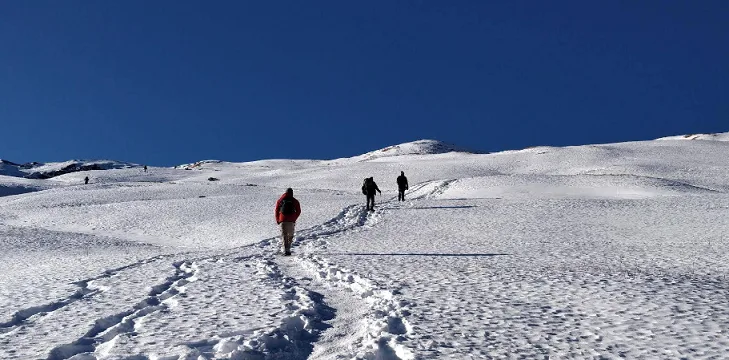
Winter treks are magical. The white snow, fresh air, and calm mountains create a feeling that can’t be explained in words. But at the same time, if you don’t have the right shoes, this dream can quickly turn into discomfort. Slippery paths, cold feet, and wet socks are common issues if you try snow hiking with normal shoes. That is why winter hiking shoes and snow hiking boots are very important.
I am not just writing this from theory. I am a professional ski instructor in Auli, and every winter I see hundreds of tourists and trekkers coming here without proper footwear. Many of them rent shoes from us because their normal sports shoes fail in snow. From my experience of running ski courses in Auli and also renting out snow shoes and costumes, I know exactly what kind of boots are useful in snow and which ones give you trouble.
In this article, I will share a list of the best winter hiking boots for men and women, along with some warm winter walking shoes for casual snow walks. These shoes are waterproof, warm, and specially designed for trekking on snow trails. I have personally seen people using these kinds of shoes during Auli treks, skiing, and snow hikes. So you can trust that the suggestions are based on both practical use and real mountain experience.
Table of Contents
Why You Need Special Shoes for Winter Hiking
Many people think they can walk in snow with their normal sports shoes or running shoes. But trust me, once you step into real snow or frozen trails, you will understand why they fail. Snow melts on the shoe surface, water seeps inside, and within minutes your socks get wet. With cold wind blowing, wet socks quickly turn into frozen socks. This is where proper winter hiking shoes and snow trekking boots become important.
1. Warmth & Insulation
The first need is warmth. Normal shoes do not have inner insulation. In Auli, I have seen tourists who wear casual sneakers; within 10–15 minutes of walking on snow they start shivering because their feet are ice cold. Good warm hiking boots or warm winter walking shoes have padding inside that keeps your feet cozy even in sub-zero temperatures.
2. Waterproofing
In snow, waterproofing is a must. Without it, your shoe absorbs water and becomes heavy. When I rent out snow shoes to people in Auli, many of them realise the difference after trying both. Normal sports shoes are soaked in less than half an hour, while winter hiking boots waterproof can last the whole day without letting water inside.
3. Grip & Anti-Slip Sole
Snow and ice are slippery. A wrong step can cause a fall and serious injury. Good snow hiking boots come with deep lugs and anti-slip rubber soles that hold the ground strongly. When I take skiing batches, I notice that people wearing proper snow trekking boots walk confidently on ice, while others keep struggling.
4. Ankle Support & Durability
Winter treks are not just flat walking, they include uneven and steep patches. That’s why strong ankle support is necessary. Boots made for snow trekking are designed to give stability, so you don’t twist your ankle. They are also more durable than normal sports shoes, as they are built for harsh terrain.
5. Comfort for Long Walks
One more thing people ignore is comfort. Snow treks sometimes go on for hours. Wearing heavy and wrong shoes makes it difficult to continue. That’s why lightweight winter hiking boots are always better for long-distance snow trails. When tourists rent shoes from us, I always suggest lightweight options to those who are planning longer snow walks, while heavier boots work fine for short walks or skiing.
👉 In short, snow trekking boots are not just a luxury, they are a safety requirement. They keep your feet warm, dry, and stable so that you can enjoy the beauty of snow without worrying about frostbite or slipping.
If you are planning a winter trip to Uttarakhand, knowing the right snowfall spots is very important. In my guide on Snowfall Places in Uttarakhand for 2025-26, I have shared the best destinations to enjoy fresh snow, perfect for trying your new hiking boots.
My Best Pick For Winter Hiking Shoes And Snow Boots
Now that you know why proper shoes are important for winter treks, let us move towards the main part of this article – the actual boots and shoes you can buy. I have carefully selected some of the best winter hiking shoes, snow trekking boots, and warm winter walking shoes available on Amazon.
Why Amazon? Because it is the most trusted platform where you can easily compare prices, read reviews, and also return the product if it doesn’t fit you. Most of the tourists who come to Auli and ask me about footwear also prefer ordering from Amazon because of this easy process.
While preparing this list, I did not just pick random products. I put real effort here:
Some of these snow hiking boots I have personally seen or even used during skiing and trekking sessions in Auli.
Some products are the same type that we rent out to tourists when they come for skiing courses or snow walks.
And for the rest, I have done proper research, checked user reviews, and compared features before suggesting them.
I want to be transparent here: I am sharing Amazon affiliate links in this article. That means, if you purchase any product using my link, I will get a small commission. You don’t pay anything extra, but it helps me to keep creating such useful guides. Honestly, after putting this much hard work into research and writing, this is the only support I expect from you.
So, let us go ahead and check some of the top winter hiking boots for men and women that will keep you safe, warm, and comfortable on your next snow trek.
1. Columbia Men Omni Grip Bugaboot
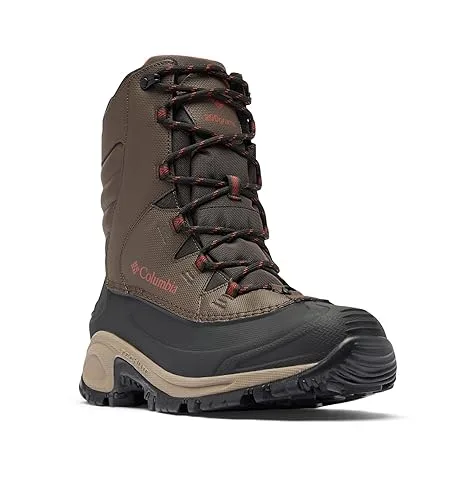
Detailed Review:
Columbia is a global name when it comes to outdoor gear, and their Omni Grip Bugaboot is designed exactly for snow trails. The boot comes with Omni-Grip sole technology that grips icy surfaces and prevents slipping. It also has a waterproof outer layer to keep snow and water away, plus insulation padding inside to keep the feet warm in sub-zero conditions.
Pros:
Lightweight compared to traditional snow boots
Reliable brand quality
Perfect for trekking trails with mixed snow and mud
Cons:
Slightly premium price compared to local brands
Not for extreme expedition-level cold (–20°C type)
My Note: In Auli, I have seen tourists wearing Columbia shoes, and most of them were satisfied. They told me that even after walking hours on icy patches, their feet remained dry. For someone who wants quality and durability, this is a trusted option.
2. Coasters CTR OD-70 Waterproof Trekking Shoes (Men)
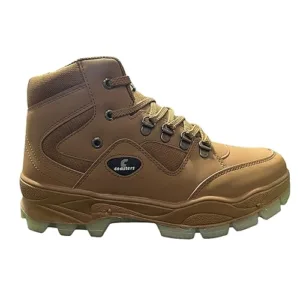
Detailed Review:
This one is a budget-friendly lightweight snow trekking boot. It comes with a waterproof material and an anti-slip sole, which means even if you are walking in slush or thin snow, your feet stay dry and stable. It doesn’t have as much high-tech insulation as premium brands, but for beginners or casual snow treks, it works really well.
Pros:
Affordable pricing
Lightweight and easy to walk in
Decent waterproofing
Cons:
Not very long-lasting for hardcore trekking
Limited insulation, so not for extreme cold
My Note: In my ski training batches, many young students or budget travellers use similar shoes. They may not be fancy, but for short Auli snow treks or weekend trips, they do the job well.
3. YOHO Slays Women Comfortable Boots
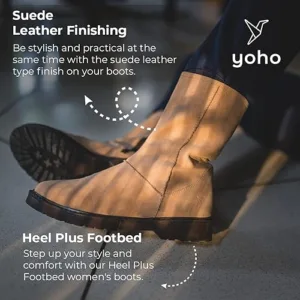
Detailed Review:
This is a stylish yet functional boot designed for women. It has a warm inner lining that keeps feet cozy and a sole that provides decent grip on snowy paths. Unlike bulky trekking boots, it is lightweight and also looks good for casual winter outfits.
Pros:
Stylish design, not just utility
Warm inner padding
Comfortable for both trekking and casual wear
Cons:
Not made for very rugged trekking
Waterproofing is average
My Note: I remember a tourist in Auli who came with similar women’s boots. She joined our snow-walk group till the ski slope, and she was very comfortable. Later she told me she chose them because she wanted boots that work for trekking and also look good in photos. This is a great pick for women who want both function and style.
👉 So, these lightweight winter hiking boots are best for:
Beginners in snow trekking
Families and casual tourists in places like Auli, Manali or Gulmarg
Long winter walks where heavy boots become uncomfortable
4. Bacca Bucci Men Leather Boot
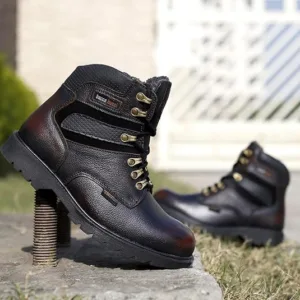
Detailed Review:
Bacca Bucci is an Indian brand that has become popular among trekkers and bikers. This leather boot is made with tough genuine leather, giving it durability and protection against snow slush. The inner lining keeps the feet warm, and the deep sole pattern provides better grip on icy trails.
Pros:
Stylish leather design
Durable and long-lasting
Good warmth for snow trekking
Cons:
Heavier than lightweight synthetic boots
Takes time to break-in (not instantly comfortable)
My Note: In Auli, many young trekkers prefer Bacca Bucci boots because they look smart and can be worn even after the trip as a fashion shoe. I personally suggest them to those who want one boot for both trekking and casual winter wear.
Confused between Auli and Gulmarg for skiing this winter? I have compared both destinations in detail in my article Auli vs Gulmarg – Best Ski Destination in India. Check it out to decide where to wear your winter trekking shoes for the ultimate snow adventure.
5. Liberty Warrior Combat Leather Military Boots (Men)
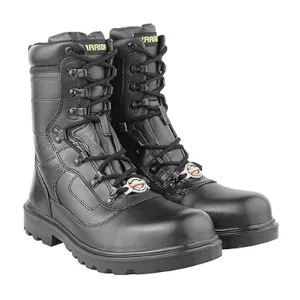
Detailed Review:
These are rugged combat-style boots originally designed for tough use. The strong genuine leather makes them perfect for winter treks where durability is needed. While not as soft as premium brands, they are excellent for snow trekking boots because of their stability and water resistance.
Pros:
Heavy-duty military style
Very durable and stable
Affordable for the quality
Cons:
A bit bulky for long casual walks
Takes time to adjust for comfort
My Note: During my ski sessions in Auli, I have seen many local guides and porters wearing Liberty boots. They like them because they last longer than normal shoes and give strong ankle support. For anyone planning multiple snow treks, this is a reliable option.
6. Wildcraft Water Repellent Trekking Shoes (Men)
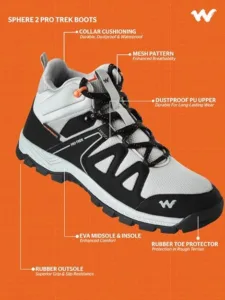
Detailed Review:
Wildcraft is one of the most trusted Indian outdoor brands. This shoe comes with water-repellent material, strong sole grip, and ankle support, making it an ideal choice for snowy and muddy trails. It is not too heavy and can be used even for high-altitude treks where snow is moderate.
Pros:
Branded outdoor gear, reliable quality
Water repellent and quick drying
Comfortable for long treks
Cons:
Not fully waterproof, only repellent
Less warm compared to leather boots
My Note: I personally like Wildcraft gear and have recommended it to many tourists in Auli. One of my students wore this exact pair during his beginner skiing course. He managed the snow well, and after 3 days, he told me these boots were perfect for someone who wants trekking + city use together.
👉 These men’s winter hiking boots are best for:
Serious trekkers who want durability and grip
Snow trekking in places like Auli, Kedarkantha, Manali, or Kashmir
People who want one pair that works both on treks and in city winters
7. HEAVENGLOW Women’s Winter Snow Boots
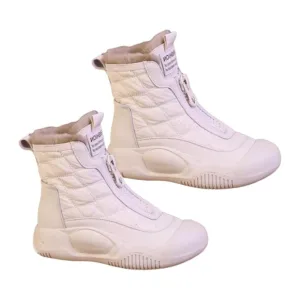
Detailed Review:
These boots are designed with insulated padding inside, which makes them perfect for cold climates. The outer layer is waterproof, so you don’t have to worry about snow melting on your shoes. They are lightweight, which makes them ideal for long snow walks and trekking trails.
Pros:
Lightweight and easy to walk in
Waterproof with good warmth
Simple design that goes with all outfits
Cons:
Not as stylish as some fashion boots
For extreme cold, you may need thicker socks
My Note: I once met a family from Delhi who had come to Auli for snow trekking. The lady of the family had boots similar to HEAVENGLOW. She told me she chose them because she wanted something light yet warm. After a full day of walking in snow, her feedback was that the shoes were very comfortable and kept her feet dry.
8. ECOMISTIQ®3x Women’s Winter Snow Boots
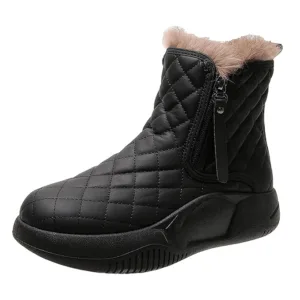
Detailed Review:
These boots are designed with thick inner lining for extra warmth, making them perfect for women who feel colder in the feet. The waterproof layer keeps the snow out, and the sole grip is decent for slippery surfaces. They are slightly bulkier compared to HEAVENGLOW, but that adds extra insulation.
Pros:
Very warm, perfect for cold-sensitive people
Waterproof outer build
Good ankle support
Cons:
Slightly heavier than lightweight models
Not for casual fashion use, more for trekking
My Note: During one of my skiing courses in Auli, a student wore similar boots. She told me that even though the boots felt a bit heavier, she was very happy because her feet stayed warm throughout the day. In fact, she said these boots made her snow experience much more enjoyable.
👉 These women’s winter hiking boots are best for:
Snow treks in Auli, Manali, or Kashmir
Long snow walks where waterproofing is important
Women who want balance between warmth and comfort
9. Woodland Men’s Leather Fashion Boot

Detailed Review:
Woodland is a household name in India when it comes to tough outdoor shoes. This leather boot is not just stylish, but also practical for winter conditions. The leather upper gives natural water resistance, while the thick sole provides grip on snow-covered paths. It is not as insulated as a hardcore trekking boot, but with warm socks, it works really well for short snow treks and winter walks.
Pros:
Stylish leather design, good for both city and hills
Durable and long-lasting
Decent grip on snow
Cons:
Not 100% waterproof, only water-resistant
Limited insulation compared to snow-specific boots
My Note: In Auli, I have seen many tourists coming with Woodland boots. Some of them even rented snow gear from me but proudly said, “Boots toh Woodland ke le aaye.” For short snow walks, this boot works perfectly. Plus, after the trip, you can continue using it in city winters.
10. Columbia Women’s Red Hills Omni Heat Hiking Boot

Detailed Review:
This boot is equipped with Columbia’s Omni-Heat technology, which reflects body heat and keeps feet warm even in cold weather. It is lightweight, waterproof, and comfortable for long walks. The grip is strong enough for snow patches, making it an ideal choice for women who want both warmth and durability.
Pros:
Lightweight yet very warm
Waterproof build for snow treks
Omni-Heat reflective lining keeps feet cozy
Cons:
Premium price range
Needs little care to maintain waterproofing
My Note: I personally recommend Columbia shoes to women trekkers in Auli who ask me for suggestions. Once, a student in my skiing batch wore these Red Hills boots, and she told me it felt like walking with a built-in heater in her shoes. She could spend the whole day in snow without cold feet.
👉 These warm winter walking shoes are best for:
Tourists who want light snow walks in Auli, Gulmarg, or Manali
Casual winter use with stylish look
Trekkers who don’t want heavy boots but still need warmth and waterproofing
Comparison Table – Best Winter Hiking Shoes 2025
Product | Category | Key Features | Best For | Amazon Link |
Columbia Men Omni Grip Bugaboot | Lightweight Winter Hiking Boots (Men) | Waterproof, Omni-Grip sole, warm lining | Serious winter treks in snow | |
Coasters CTR OD-70 Waterproof Shoes | Lightweight Hiking Boots (Men) | Anti-slip sole, durable, budget-friendly | Beginners & budget buyers | |
YOHO Slays Women Comfortable Boots | Lightweight Hiking Boots (Women) | Cozy lining, stylish & functional | Women casual + trekking use | |
Bacca Bucci Men Leather Boot | Best Winter Hiking Boots (Men) | Leather build, stylish & rugged | Winter trekking + casual wear | |
Liberty Warrior Combat Boots | Best Winter Hiking Boots (Men) | Genuine leather, military durability | Hardcore trekking, snow trails | |
Wildcraft Water Repellent Trekking Shoes | Best Winter Hiking Boots (Men) | Water repellent, ankle support | Long treks & outdoor use | |
HEAVENGLOW Women’s Winter Snow Boots | Best Winter Hiking Boots (Women) | Insulated, lightweight | Women daily + hiking use | |
ECOMISTIQ®3x Women’s Winter Boots | Best Winter Hiking Boots (Women) | Waterproof, cozy lining | Women trekking + casual | |
Woodland Men’s Leather Fashion Boot | Warm Winter Walking Shoes (Men) | Leather, stylish, good grip | Light snow + urban wear | |
Columbia Women’s Red Hills Omni Heat Boot | Warm Winter Walking Shoes (Women) | Omni Heat tech, waterproof | Women long winter treks |
📝 Buying Guide – How to Choose the Right Winter Hiking Shoes
Choosing the right shoes for snow is not as simple as picking any boot. Different treks, different weather, and even different people need different kinds of shoes. Over the years, as a ski instructor in Auli, I have seen all kinds of tourists – some coming with perfect boots, while others struggling in normal sneakers. From that experience, here are some important points you must consider before buying your pair of winter hiking boots.
1. Waterproofing vs. Water-Resistant
In snow, waterproofing is not optional – it is a must. Snow melts into water the moment it touches warm surfaces, and if your shoes are not waterproof, within minutes your socks will be wet. Wet feet in sub-zero temperatures can even lead to frostbite.
Waterproof boots (like Columbia or Wildcraft) are best for long snow treks.
Water-resistant boots (like Woodland) work fine for short walks or casual winter use.
👉 In Auli, I have seen many people wearing sports shoes. After 10 minutes, they rush to rent waterproof snow trekking boots from us. That’s how big a difference waterproofing makes.
2. Insulation & Warmth
Insulation is what keeps your feet cozy even when the ground is frozen. Some boots come with thick padded lining, while others use special tech like Columbia’s Omni-Heat.
For short treks & city winters, light insulation is enough.
For high-altitude treks or skiing, you need warm hiking boots with thick lining.
👉 Once, I met a couple in Auli where the husband had leather boots (less insulation) and the wife had insulated snow boots. After one hour, the husband was shivering, but the wife was enjoying the snow without any issue.
3. Grip & Sole Quality
Snow and ice are slippery, so the sole is as important as insulation. Look for deep lug patterns and anti-slip rubber soles.
Flat soles = risk of slipping.
Deep patterned soles = stability and safety.
👉 During my skiing lessons, I notice that people with proper snow hiking boots walk confidently on the slopes, while others keep sliding and falling.
4. Ankle Support & Fit
Treks in winter often involve uneven terrain. Boots with good ankle support prevent injuries. Also, always go for half a size bigger than your regular size because you will be wearing thick woollen socks inside.
👉 In our rental shop, I often see tourists complaining about tight shoes. Once they change to a half-size larger boot, the comfort difference is huge.
5. Weight of the Shoe
This is where the decision between lightweight winter hiking boots and heavy trekking boots comes in.
Lightweight boots are better for long-distance walking or family snow trips.
Heavy boots are better for skiing, short but intense treks, or carrying heavy loads.
👉 Personally, when I go for long treks in snow, I always pick lightweight ones. But when I am skiing or teaching on slopes, heavier boots give me better grip and stability.
✅ Quick Tip from Auli Experience:
If you are coming just for sightseeing or short snow play, rent warm walking boots. If you are planning a trek like Gorson Bugyal or Kedarkantha, invest in good quality winter hiking boots waterproof.
If you want to go beyond hiking and try skiing in Auli, don’t miss my detailed post on Auli Skiing Package 2024-25. It covers ski courses, packages, and rentals – including snow boots – that make your Himalayan trip complete.
🧼 Tips to Maintain Your Winter Hiking Boots
Buying good winter hiking boots is an investment. But if you don’t take care of them, even the best pair will get spoiled in one season. I have seen this many times in Auli – tourists come with new shoes, play in snow, then leave them wet near the heater. Next morning, the boots are cracked and useless. To avoid this, here are some simple maintenance tips:
1. Always Dry Properly After Snow Use
After walking in snow, your boots will always have some moisture. Never keep them near direct heat like fire or heater. The leather or synthetic material cracks. Instead, remove the insole and let the boots dry naturally at room temperature.
👉 In our rental shop at Auli, we dry all the snow trekking boots overnight using newspaper stuffing. This absorbs moisture quickly without harming the shoe.
2. Use Waterproofing Spray
Even if you buy winter hiking boots waterproof, after a few uses the coating starts reducing. Spray a waterproofing solution once in a while to maintain performance.
👉 I always recommend this to students who plan multiple snow treks. A simple waterproof spray can extend the life of your boots by 2–3 years.
3. Clean the Soles Regularly
Snow often hides mud, small stones, and even road salt (in city snow). If you don’t clean the sole, it hardens and reduces grip. Wash the soles with water and a soft brush after every trip.
4. Store in a Cool, Dry Place
Never pack wet boots in plastic bags. Always dry them first and store in an airy place. Humidity causes fungus, and leather starts smelling bad.
5. Use Socks Wisely
A good pair of woollen or thermal socks not only keeps your feet warm but also absorbs sweat. This protects the inner lining of the boots. If you use warm hiking boots without socks, the inner padding wears out quickly.
✅ Quick Tip from My Experience:
Many tourists rent shoes from us and then return them fully wet. We take extra effort to dry and maintain them, otherwise they wouldn’t survive a whole season. If you buy your own pair, give them the same care – and they will last for many winters.
❓ FAQs about Winter Hiking & Snow Boots
Q1. Can I use normal hiking shoes for snow?
Not really. Normal hiking shoes are not made for snow – they soak water quickly and give no insulation. In Auli, I often see tourists trying with their sports shoes, but within minutes they are cold and wet. For safety and comfort, always go for winter hiking boots waterproof or snow trekking boots.
Q2. Are snow boots and hiking boots the same?
No, there is a difference.
Snow boots are usually warmer, bulkier, and designed mainly for snow play and casual winter use.
Winter hiking boots are lighter, give more grip and ankle support, and are better for trekking.
👉 In Auli, I tell people: if your plan is just to play in snow, snow boots are fine. But for trekking, choose proper hiking boots for snow.
Q3. Do I need waterproof boots for snow hiking?
Yes, definitely. Snow melts into water, and without waterproof boots, your socks will be wet in no time. Wet socks in cold = high chance of frostbite. Even budget travellers in Auli end up renting winter hiking boots waterproof from us after struggling with normal shoes.
Q4. What shoes are best for snowshoeing?
For snowshoeing, you need lightweight winter hiking boots with strong grip. Heavy boots make it hard to walk with snowshoes attached. A good waterproof and insulated lightweight model works best.
Q5. What are the best budget winter hiking boots?
Brands like Liberty Warrior Combat and Coasters CTR OD-70 are good budget options. They may not have advanced insulation, but they are reliable for beginners. Many students in my skiing batches use such boots for their first snow experience.
Q6. What are the warmest hiking boots for extreme cold?
For very low temperatures (like –10°C and below), go for boots with thick insulation or special technology like Columbia’s Omni-Heat. Leather boots like Bacca Bucci also provide strong warmth when paired with woollen socks. I’ve seen trekkers in Auli use such boots comfortably even on long days in snow.
Q7. Can I rent snow boots instead of buying?
Yes, in places like Auli, Gulmarg, or Manali, you can rent snow boots easily. In fact, I personally rent out snow shoes and costumes in Auli to tourists. Renting makes sense for a short trip, but if you plan regular winter treks, buying your own warm hiking boots is a better choice.
✅ Conclusion – Which Winter Hiking Shoes Should You Buy?
By now, you must have understood that winter hiking boots are not just another item in your gear list – they are your first line of protection in snow. Whether you are planning a full snow trek, a skiing course, or just casual winter walks, the right shoes will decide if your experience is comfortable or full of struggle.
From my own experience as a ski instructor in Auli, I have seen how much difference proper footwear makes. Every winter, I meet people who regret not bringing the right shoes. Many of them finally rent snow trekking boots from us, and then they realise how easy it becomes to walk on snow once you wear the correct footwear.
If I have to give personal recommendations from this list:
For men, I would suggest the Wildcraft Water Repellent Trekking Shoes because they balance durability, comfort, and price. They work perfectly for treks like Gorson Bugyal or Kedarkantha.
For women, my top choice is the Columbia Women’s Red Hills Omni Heat Hiking Boot. I’ve personally seen students in Auli use these boots during long skiing days, and they never complained about cold feet.
If your plan is just casual snow play or short walks, then warm winter walking shoes like Woodland or lightweight Columbia models are more than enough. But if you’re serious about trekking or plan to visit high-altitude snow trails often, then investing in the best winter hiking boots men’s or best winter hiking boots women’s will be worth every rupee.
👉 I have spent time researching these products, used some myself, and observed many others in action. All I expect in return is – if you find this guide useful, please consider buying from the Amazon links I’ve shared. It won’t cost you extra, but it will help me continue writing practical guides based on real Himalayan experience.
So, before you pack your bags for Auli, Manali, Gulmarg, or Kashmir, make sure you also pack the right pair of snow trekking boots. Trust me, your feet will thank you when you walk warm, dry, and confident on white winter trails.
– Mohit Bangari
09 Sep 2025


Explore the beauty and cultures of the Himalayas, from Jammu and Kashmir to Arunachal Pradesh, Tibet and Nepal. My blog shares stories, pictures, and fun articles about this amazing region. Come along on a journey where each mountain has a tale and every valley hides a treasure. Join me as I discover the magic of the mountains together.
Welcome to my Himalayan Adventure!

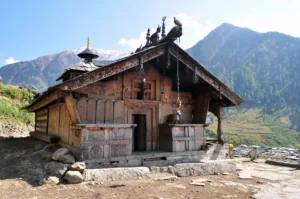



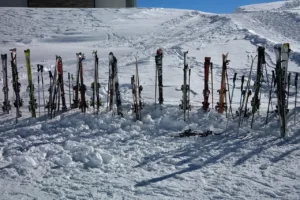
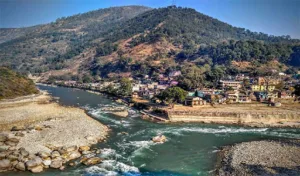
1 thought on “Best Winter Hiking Shoes & Snow Boots 2025-26”
Super helpful!!
I buy Bacca Bucci shoe for my upcoming Manali visit.
Thanks Mohit Jii!!